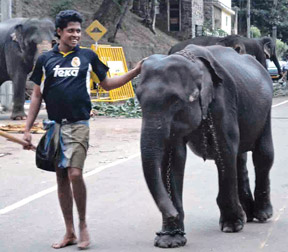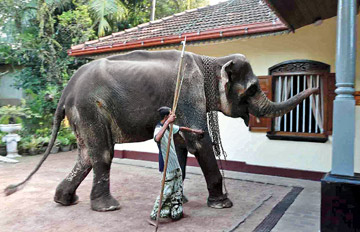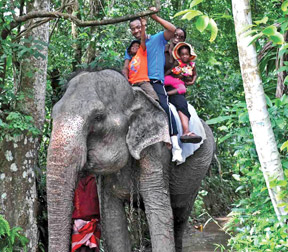|
Animal rights activists raise concern:
Elephants released under strict criteria -DG National Zoological
Gardens
By Shanika SRIYANANDA

|

DG Bashwara Senanka
Gunaratne-"No owner was allowed to use elephants released from
the PEO in the transportation of goods and also in safaris, but
were only
permitted to use them in religious and cultural events. However,
Gunaratne agreed that 12 elephants
from the PEO were released to temples and private owners under a
tough criteria which has post-surveillance about the
animalís well-being." |
Baby elephant Abaya was not lucky to survive in its own habitat not
in an alien land, due to the cruelty meted out by its masters. In 1995,
Abaya was forcibly taken to a famous temple in the South. After a
five-year stint, one fine day, he was found dead. The cause of death was
endorsed as 'cruelty by the mahout', who bad repeatedly assaulted the
young animal at each session of the training process.
The punishable offence went unheard, while the mahout who 'killed'
Abaya was assigned to another task - looking after 'Lasanda', who was
donated to the Sri Vishnu Dewalaya from the Pinnawala Elephant Orphanage
(PEO).
Animal rights groups are now up in arms against the authorities who
continue to 'donate' tamed elephants to people who had 'poor' past
records of taking care of animals. "There are enough cases to show that
the authorities are releasing elephants from Pinnawala to the same group
of people who don't take care of the animals.
Though officials boast that the animals are under close surveillance,
they don't do any monitoring once an elephant is released to a private
owner.
Otherwise, why don't they blacklist owners who carelessly handle
these elephants", the Director Sri Lanka Environment Trust Sajeewa
Chamikara, queried.
He recalled another incident, where two elephants - Gajaba and
Sinharaja- from Pinnawela were released to the Polwatta Temple in
Kollupitiya in 1994. Sinharaja, who was chained in close proximity of a
railway track in Giriulla, was killed after being struck by lightning.
Without considering the cause of death due to poor handling of the
animal by the caretaker, Esala - an elephant from the orphanage was once
again donated to the same person who took care of elephants of the
Sasanawardena Temple of Meerigama.
Vishwa of the orphanage was donated to the same temple in 2001 and
now is in a nature park in Ja-Ela.Chamikara blamed officials of the
orphanage for donating elephants to temples, private owners and those
interested in 'showing' that they owned elephants while they are not
financially capable of providing the required environment for the
animal.
"Sama, the tamed elephant donated to the Allenmathiniyaramaya
Polhengoda from Pinnawela, is being looked after by a mahout who was
chased away from Pinnawala for the alleged killing of elephant Nilagiri
in the Pinnawela Orphanage.
This is why we question where is the monitoring system of the
so-called institutions after releasing elephants from Pinnawela", he
said.
Chamikara said animal activists were not against donating elephants
from Pinnawela for cultural and religious events, but there was a need
to implement a proper system where a group of elephants are trained for
these events.
"Plans were drawn to implement this during former Minister A.H.M
Fowzie's tenure but due to pressure from certain groups who feared of
losing the income generated through elephants being used for cultural
events and other activities, the then government abandoned the idea", he
said.
|

This elephant has lost its looks and body weight and is
malnurished. |
However, activists claim that elephants in the PEO are facing danger
as they are given away to temples and other interested parties on
political and personnel influence without following stipulated
requirements.
According to statistics, the purpose of giving elephants to private
owners to breed was futile as only three births were recorded from
elephants given for domestication, while there have been 67 births from
elephants at Pinnawala. " The main reason for private owners not having
captive breeding is that when a female elephant gets pregnant, the owner
loses the income they earned from her during her pregnancy period which
is 22-long months.
It is also costly as they need extra allocation to maintain a
pregnant she elephant", he said adding that the country's most
magnificent tuskers - 'Raja' and 'Millangoda Maha Atha', the elephant
with the longest tusks in Asia, died without being able to pass on their
genes.He said most of the elephants in temples and with private owners
suffer due to malnutrition and cruelty.
The situation has aggravated with the Cabinet Paper No.
11/1182/579/017 submitted on May 25, 2011 which has given permission to
release elephants from PEO to private owners. "Over 12 elephants have
been given to temples and private owners since June last year. since its
inception, over 66 elephants including six tuskers were released to
temples and private owners.
In 2009, two baby tuskers were forcibly taken away by an influential
person. and there were six tuskers", he said.
Chamikara said plans were under way to release 'Sumana', the only
tusker of the PEO to a politician and if the deal takes place, the PEO
would lose the only animal remaining for captive breeding.
|

This aged elephant is used for safaris in Habarana but is
terribly malnurished. |
He also revealed a plan to release another six elephants including 'Mihiri'
(6) and 'Mahasen' (7) under a animal exchange program with Iran and
Czech Republic. According to informed sources it is sad to note about
the fate of some of the elephants in temples as they have become walking
skeletons due to lack of proper care and nutrition. Most of the
elephants are being used in safaris and transportation of illegally
felled trees.
The mahouts who were found guilty of ill-treating elephants are given
the task of taking care of elephants under other owners.
Meanwhile, activists requested the Department of Wildlife
Conservation and the Department of National Zoological Gardens to set up
a DNA register for all elephants at Pinnawala and tamed elephants
belonging to private owners to have a proper surveillance of these
elephants.
A written request was sent to the Director General of the National
Zoological Gardens, Bashwara Senanka Gunaratne on July 08, 2011 about
establishing a DNA data base of these elephants and also a system to
attach microchips on each elephant for easy trekking of the animal.
Activists claim their requests have fallen deaf ears and no response
was forthcoming.
They request the authorities concerned to draw plans to protect the
number of captive elephants which are fast diminishing and to implement
new plans not to gain political mileages but to have long-term plans to
conserve jumbos in captivity.
When contacted the DG National Zoological Gardens, refuted the claims
of releasing elephants from the PEO in an adhoc manner and said the PEO
faces no such allegations. " How many times we have clarified this issue
with the media, but some NGOs raise this issue from time to time. We
always said that there is a severe dearth of tamed elephants and only
115 elephants circulate for all the cultural and religious events. We
need to address the issue as the country needs to maintain these
important and historical events for postering", he said adding the
country's tamed elephants are over-used and were heavily stressed.
He said no owner was allowed to use elephants released from the PEO
in the transportation of goods and also in safaris, but were only
permitted to use them in religious and cultural events. However,
Gunaratne agreed that 12 elephants from the PEO were released to temples
and private owners under a tough criteria which has post-surveillance
about the animal's well-being.
"But I want to highlight that no elephant was given under the new
program we commenced mid May 2011.
Selection and monitoring will be done according to a criteria
prepared by a Committee headed by the Secretary of Ministry of Wildlife
and will look into the financial status of the applicant and the
environment to shelter an elephant", he said.Gunaratne spelt out new
plans to provide facilities for elephants in the PEO under a
comprehensive plan. " The existing land will be expanded by adding
another 28 acres of adjoining land in Pinnawela and Rs. 100 million has
been allocated. Another project was to set up an alternative PEO similar
to Pinnawela.
We are doing a feasibility study at the moment to select a land
suitable for elephants.
The main purpose is to provide more care for animals and also to
promote captive breeding to find solutions for the dwindling number of
elephants in the country", he said.
Referring to a letter received by the Wildlife Conservation Trust,
which proposed to set up a DNA data base for all elephants in the PEO
and to fix micro chips to animals to track them easily to maintain a
better monitoring system, Gunaratne said the proposal to fix microchips
on PEO animals was a good idea but he disagreed with setting up a DNA
data base for them."We will not have a DNA data as it runs the risk of
pirating genes of our elephants", he said adding that the Department of
National Zoological Gardens would take every step to protect animals.
Meanwhile, the DG refuted allegations of releasing any elephant back
to those who were cruel to these animals.
The tug-of-war between animal activists and the Wildlife Authorities
continues for several years without any solution in sight. The need of
the hour is to get all into one fold and explore possibilities of saving
and taking care of the already dwindling number of tamed elephants.
Pinnawela Elephant Orphanage (PEO)
Situated in Rambukkana, Kegalle, it was started in 1975 by the
Department of Wildlife Conservation with five baby elephants on a twenty
five acre land on the banks of the Maha Oya river to take care and
protection for baby elephants, whose mothers either died or have been
killed. Being an attraction among local and foreign visitors, the income
from which helps to maintain the orphanage and it is also among the few
elephant orphanages in the world.In 1978, the PEO was taken over by the
National Zoological Gardens and a captive breeding program was launched
in 1982 with twelve animals, five of whom were babies.
In 1997, there were 52 animals of which there were 10 babies under 3
years of age.
* 1975: 5 baby elephants
* 1978: 12 elephants, of those 5 babies.
* 1997: 56 elephants
* 1998: 63 elephants
* 2000: 70 elephants
* 2003: 65 elephants
* 2010: 84 elephants
The conducive environment for breeding at Pinnawela made the elephant
breeding program a success with Vijaya and Neela and females Kumari,
Anusha, Mathalie and Komali giving birth to baby elephants. Sukumalee
was the first baby elephant born in orphanage and in mid 1998 there have
been fourteen births, eight males and six females at Pinnawela, with one
second generation birth in early 1998.Since then, 84 were born at the
PEO and 12 were released to temples and private owners since June last
year. Shama (female, aged 24), Lasanda (female, aged 18), Mihindu (male,
aged 13), Haritha (male, aged 10 years), Atlas (male, aged seven),
Charaka (male, aged five)Asela (male aged 8), Tharindu (male aged 5),
Wasana ( Male aged 11), Arjuna ( male aged 14) and Vishwa (male aged 5)
were among those. |

